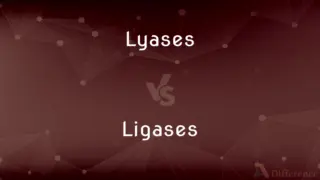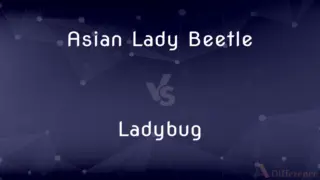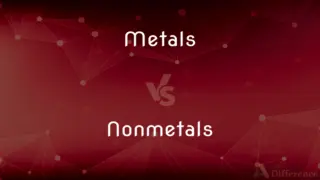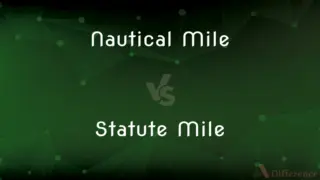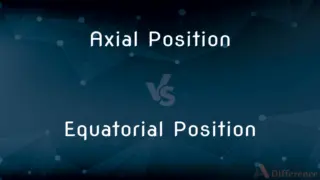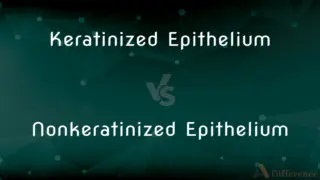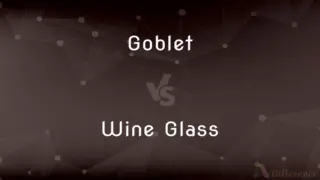Enology vs. Oenology — What's the Difference?
By Urooj Arif & Maham Liaqat — Updated on March 28, 2024
Enology is the American English spelling for the study of wines, focusing on wine-making processes, while oenology is the British English variant of the same term, with no difference in meaning.

Difference Between Enology and Oenology
Table of Contents
ADVERTISEMENT
Key Differences
Enology, the American English spelling, refers to the science and study of all aspects of wine and winemaking, from fermentation to bottling. It encompasses the chemical processes involved in wine production, as well as the influence of terroir, viticulture, and historical and cultural aspects. Oenology, on the other hand, follows the British English spelling tradition, mirroring the same scope and areas of study. The difference in spelling does not reflect a difference in the field of study but rather illustrates the linguistic variations between American and British English.
In academic and professional settings within the United States, "enology" is the preferred term, and it is commonly seen in American literature, universities offering wine studies, and industry terminology. Conversely, "oenology" is predominantly used in the UK, as well as in other countries that follow British English conventions, including Canada, Australia, and New Zealand. This distinction in spelling is analogous to other American versus British English spelling differences, such as "color" versus "colour."
Both terms are derived from the Greek word "oinos," meaning wine, and "logia," meaning study, underscoring their common root despite the spelling variation. Whether one encounters "enology" or "oenology" in text largely depends on the geographic location or the origin of the publication or material being referenced.
Professionals in the field, regardless of the spelling they adhere to, are called enologists or oenologists. They are experts in wine science, focusing on improving wine quality, innovating production techniques, and often engaging in wine tasting to assess characteristics and ensure quality standards are met. The choice between "enology" and "oenology" does not influence the nature of the profession or the expertise required.
The global wine industry recognizes both spellings as referring to the same field of study. Whether one reads about advancements in "enology" in an American journal or attends an "oenology" course in Europe, the fundamental knowledge and objectives remain consistent, underscoring the universal appreciation and scientific approach to winemaking.
ADVERTISEMENT
Comparison Chart
Spelling
American English
British English
Definition
The science of wine and winemaking.
The science of wine and winemaking.
Usage
Preferred in the United States.
Preferred in the UK, Canada, Australia, and New Zealand.
Derived from
Greek "oinos" (wine) + "logia" (study).
Greek "oinos" (wine) + "logia" (study).
Professional Title
Enologist
Oenologist
Focus
Wine fermentation, production, and quality control.
Wine fermentation, production, and quality control.
Academic Programs
Often titled "Enology."
Often titled "Oenology."
Industry Recognition
Recognized in American wine industry contexts.
Recognized in British and international contexts.
Compare with Definitions
Enology
The study of wine and winemaking.
She pursued a degree in enology to become a wine producer.
Oenology
The field of wine education and research.
He lectured in oenology at the prestigious institute.
Enology
Science focusing on wine production techniques.
Enology covers both the art and science of making wine.
Oenology
The British spelling for the science of wine and winemaking.
After moving to London, she continued her studies in oenology.
Enology
Research field in wine chemistry.
His research in enology led to a breakthrough in reducing wine spoilage.
Oenology
The expertise in wine aging and fermentation.
An oenologist can determine the wine's quality by its aroma and taste.
Enology
The profession of understanding wine fermentation.
As an enologist, he specializes in the aging process of wines.
Oenology
Exploration of viticultural practices in winemaking.
Oenology also encompasses the study of vineyard management for optimal grape quality.
Enology
The academic discipline of wine study.
The university's enology program is renowned worldwide.
Oenology
Study focusing on improving wine quality.
Oenology investigates how different yeasts affect wine flavor.
Enology
The study of wine and the making of wine.
Oenology
Oenology (also enology; ee-NOL-o-jee) is the science and study of wine and winemaking. Oenology is distinct from viticulture, which is the science of the growing, cultivation, and harvesting of grapes.
Enology
(American spelling) oenology
Oenology
Variant of enology.
Enology
The art of wine making
Oenology
The scientific study of wines and winemaking.
Even though I can't drink wine, I can still study oenology and enjoy knowing about the great wines of the world.
Oenology
Knowledge of wine, scientific or practical.
Oenology
The art of wine making
Common Curiosities
Are enology and oenology the same?
Yes, enology and oenology refer to the same field of study; the difference lies in the American (enology) and British (oenology) spelling conventions.
What is enology?
Enology is the science and study of wine and winemaking, focusing on the processes from grape cultivation to wine bottling, predominantly used in American English.
How do I become an enologist or oenologist?
Becoming an enologist or oenologist typically requires specialized education in wine science, which can be obtained through degrees in enology/oenology or related fields, and practical experience in the wine industry.
What is oenology?
Oenology is the British English spelling for the science and study of wines, mirroring the same field as enology with a focus on wine production and quality.
What's the significance of studying enology or oenology?
Studying enology or oenology is crucial for anyone looking to deepen their understanding of wine, pursue a career in winemaking, or contribute to the wine industry's growth and innovation.
Do enologists work only in wineries?
While many enologists work in wineries, overseeing production and quality, others may work in research, education, or as consultants within the broader wine industry.
What do enologists and oenologists do?
Enologists and oenologists are experts in wine science, focusing on wine production, quality control, and research to innovate and improve winemaking techniques.
Can I study enology in a country that uses British English, or vice versa?
Yes, you can study wine science in any country, regardless of the spelling convention. The core subject matter remains the same across enology and oenology programs.
Is there a difference in the curriculum of enology and oenology programs?
No, enology and oenology programs offer similar curriculums focused on viticulture, wine chemistry, fermentation processes, and wine tasting, reflecting the regional spelling preferences.
Are there any certifications required to become an enologist or oenologist?
While not always required, certifications can enhance an enologist's or oenologist's credentials and opportunities, with various professional organizations offering certifications based on examinations and practical experience.
Share Your Discovery

Previous Comparison
Exemplar vs. Exemplary
Next Comparison
Cc vs. PcAuthor Spotlight
Written by
Urooj ArifUrooj is a skilled content writer at Ask Difference, known for her exceptional ability to simplify complex topics into engaging and informative content. With a passion for research and a flair for clear, concise writing, she consistently delivers articles that resonate with our diverse audience.
Co-written by
Maham Liaqat













